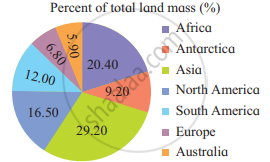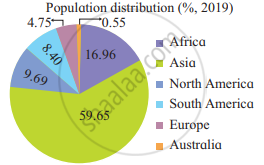Advertisements
Advertisements
प्रश्न
Analyse any three causes for uneven spatial distribution of population in India.
उत्तर
- Climate along with terrain and availability of water largely determines the pattern of the population distribution. Consequently, we observe that the North Indian Plains, deltas and Coastal Plains have higher proportion of population than the interior districts of southern and central Indian States, Himalayas, some of the north eastern and the western states.
- Another factor is the expansion of industrialization in a particular area. Urbanisation brought about by industrialization causes an uneven distribution of people in space.
- Because of the early history of human settlement and the development of the transport network in these cities, the population concentration in cities like Banaras, Patna, Kolkata, and Madurai, among others, continues to be high. As a result, India's historic cities have denser populations.
APPEARS IN
संबंधित प्रश्न
Give a geographical reason:
Population distribution is uneven.
Physical factor affecting on the distribution of population is ______.
Human factor affecting on the distribution of population is ______.
Complete the chain.
| Sr. No. | A | B | C |
| 1. | Australia | Dense equatorial forest | Highest population |
| 2. | Amazon basin | Coastal region | Sparse population area |
| 3. | East America | Desert | High population |
| 4. | India | Permanently snow covered | No residential population |
| 5. | Antarctica | Monsoon climate | Low density |
Give geographical reason
Population density is a function of population and area of a region
Identify the correct group
Social factors affecting on distribution of population:
State whether right or wrong:
Land proportion of Asia is least in the world.
State whether right or wrong:
Population density is high in Antarctica
State whether right or wrong:
Population density is high in polar region.
Differentiate between
Rural and Urban composition of population
Show the following in the world map. Index is necessary
- Uzbekistan
- The canal which make revolutionary change in ocean transport
- Milan
- Andes mountain
- The country which has highest population
- Industrial city in Europe
- Area of lumbering in Asia
Show the following in the world map. Index is necessary
- High population region in Australia
- A city of India has attraction of migration
- A mega city of USA
- Dogger Bank – fishery centre
- Rhur industrial centre
- The canal which make revolutionary change in ocean transport
- Rocky mountain region
- A major river basin of India
Observe the following graph and answer the question given below

Questions:
- What type of graph is this?
- In which continent the land percentage is highest?
- In which continent the land percentage is lowest?
- In which continent 9.2% land is found?
- What is the land percentage of Europe?
Draw diagrams and label it
- Expansive age–sex pyramid
- Circular pattern settlement
- Classification of tertiary economic activities.
Discuss the factors influencing the distribution and density of population in the world.
The first census of India was held in which year?
Which state has the lowest population?
Which state has the largest population?
Which of the following migration of population does not change the size of the population?
Which of these factors are responsible for uneven distribution of population in India?
- Climate and terrain
- Development of transport network
- Concentration of natural resources
Observe the following diagram and answer the questions given below.
 |
|
- Which continent has the least population?
- Which continent has the least landmass and also the least population?
- Which continent has the most landmass as well as most of the population?
- Which continent is missing in one of the pie charts? Why?
- What is the percentage of population distribution in Asia?
Analyse the effects of geographical factors on the distribution of world population.
Analyse the economic factors affecting the distribution of population in the world.
Analyse the social factors affecting the distribution of population in the world.

